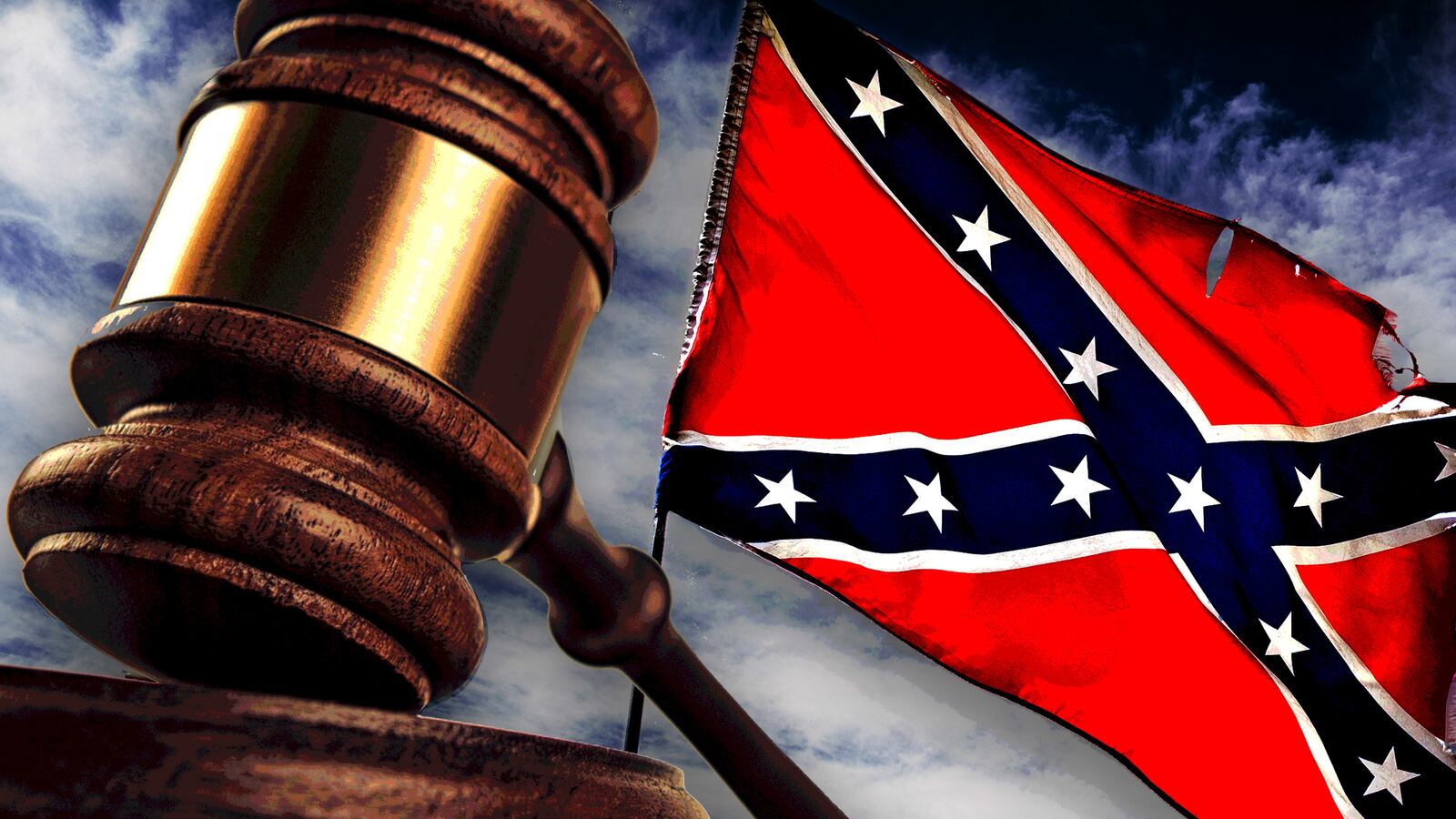Sgt. Silvia Cotriss had been a widow for a month and a cop for just shy of 20 years. And now she was being called down to the police department headquarters in Roswell, Georgia, on a Thursday in July to explain why the Confederate flag was flying prominently in her driveway.
Waiting for her in a conference room was Police Chief Rusty Grant, his deputy chief, and her captain. According to Cotriss, she had already explained to the department’s Office of Professional Standards investigators that the flag belonged to her late husband and she continued to fly it in his memory.
“This wasn’t a hard decision for me,” Chief Grant said, according to Cotriss, before telling her “as of today we’re terminating your employment from the Roswell Police Department—sign here.”
“OK, where do I sign,” Cotriss muttered.
With one pen stroke the 53-year-old, who was four years away from retiring with a full pension, copped to violating multiple policies including failing to conduct herself “to merit the confidence and respect of the public and fellow officers” and admitting her actions “destroyed public respect” for the department and the city.
But last week, Cotriss seemed to walk back from that signature when she filed a federal lawsuit in the Northern District of Georgia accusing Chief Grant and the city of Roswell of unjustly pink-slipping her, claiming they violated her First Amendment rights.
The civil complaint claims that Cotriss’s “display of the Confederate flag at her private residence was constitutionally protected speech and that speech was a substantial or motivating factor in the Roswell Police Department’s decision to terminate her… [Cotriss’s] speech did not relate to her job nor was it made in furtherance of her duties as an officer.”
The flag in question, the lawsuit notes, flew for over a year “without causing any problems,” and the display was only “at her private residence and was made as a private citizen.” But to the police department, Cotriss’s Confederate sympathies allegedly “outweighed any legitimate interest of the City in efficient public service.”
When contacted about the lawsuit, a Roswell city spokeswoman said it was policy to “not discuss pending litigation or personnel issues with the media.”
Cotriss’s firing came at a moment of high national tension around policing and cultural sensitivities.
A sniper had recently crashed a protest in downtown Dallas and killed five police officers in a gory rampage—a tragedy that led Chief Grant, Roswell’s top cop, to reach out to the city’s African-American community during Sunday church services that week.
When Chief Grant, who is white, arrived at the evangelical church called Eagle’s Nest on July 10, he was in full police regalia (service weapon and radio) and stood out among the predominantly African-American faithful. He was summoned to the pulpit and humbly bowed his head as five men, armed only with the Holy Spirit, laid their hands upon him.
“We prayed for him in front of the the entire congregation,” Pastor Lee Jenkins reflected to The Daily Beast of their hallowed moment together on that Sunday. “The police chief told me, if I ever hear or see anything that undermined the trust of the police department and particularly from African Americans, just to let him know.”
Emotions were also raw over the slayings of Philando Castile and Alton Sterling, unarmed black men in their 30s whose lives ended at the hands of law enforcement.
“A lot of people did not have compassion for the deaths of the two black men,” the pastor said. “But then there was retaliation and police officers were dead and that became the tipping point… all of a sudden white people are like, ‘Whoa, we have a problem here.’”
Black people, he said, were “already frustrated and angry,” and that was met only by white people “who were scared.”
So the blessing with Chief Grant sent a message that cops and clergy were partners fighting the same fight.
One parishioner sitting two pews behind the police chief took the message to heart.
The man composed an email, reviewed by The Daily Beast, and sent it to the police chief the next day.
He wrote how, en route to drop his son and daughter off at their preschool, he became “disheartened” when he spotted a house “flying [the] Confederate flag with a Roswell Police Department Explorer parked in the driveway.”

The email asked how he, as an African-American man, could explain to his children “that we trust our police, but in the same sentiment if I were ever to be pulled over or some situation where my family needs the police… My first thought/fear is that it may be the officer proudly flying his/her Confederate flag.”
The concerned Roswell parent was all for an individual’s “rights of free speech” as long as “there is no harm done to anyone”—but for him, a police officer flying the flag crossed the line.
He challenged the chief to help the officer “be a part of your cultural sensitivity and bias removal” agenda.
The next day, the police department tracked down the cop who was flying the flag—and found it was Silvia Cotriss.
***
Cotriss had lost her husband, Joseph, on May 11 to a massive stroke—about a month before the flag was reported to the police department.
The couple were married only three years but for Cotriss, she hadn’t had enough heart to move on yet. “I hadn’t removed any of his property or cleaned out his drawers,” she said.
Or lowered his flag.
“I, um, wasn’t ready to take his flags and stuff down yet,” she said.
The couple met at Thunder Beach, an annual motorcycle rally held in Panama City, Florida. Her husband purchased a “Rebel Motorcycle” flag: a Confederate flag with a motorcycle smack in the center as a souvenir.
At their home he erected a flagpole and hung both the Stars and Stripes and the Confederate hybrid flag. Later, when a renter asked the couple to remove the motorcycle flag, a random passer-by offered them a Confederate flag to fly in its place.
“While [Joseph] was removing it in my front yard, a person drove by and stopped and got out of the vehicle—a stranger—and he says, ‘If you’re not going to fly that flag anymore, here’s a new one,’” Cotriss said.
Cotriss claimed that the flag was a symbol of “heritage and historic significance.” (She also contests the department’s claim that she had a police cruiser in her driveway when the flag was spotted.) But the police department saw things differently.
According to an internal report, which The Daily Beast has reviewed, investigators asked Cotriss “why she would have or allow the Confederate flag be flown, especially in today’s environment,” and the sergeant replied that she “didn’t think anything was wrong with it.”
The investigators, according to the internal report, informed Cotriss that the flag stood as a symbol championed by neo-Nazi and white supremacist groups, “and that the flag was associated with the church shooting in South Carolina a few months ago” (referring to Dylann Roof’s massacre at a Charleston church in which he executed nine men and women praying together).
In a July 14 letter, Chief Grant addressed the same parishioner who sounded the Confederate flag alarm. In it, the chief wrote that the “stated goal” of Roswell Police Department’s sworn and civilian employees is to “conduct themselves on-duty and off-duty in a manner, which reflects a favorable image.”
He informed the man that Cotriss had “gone through several levels of review” and “appropriate action was taken.”
In their internal review, investigators asked Cotriss, “Do you not see [the flag] as inappropriate?”
She replied: “No, it’s Southern heritage. It about the Civil War. We’re in the South. I’ve been in Georgia all my life.”
That’s also the line Cotriss’s attorney David Ates is taking. “If you’re a police officer you do you not legally have the same First Amendment rights as Joe Smith,” asked Ates, who describes himself as an “old civil-rights attorney in Atlanta.”
“And who’s to say that the act of flying a Confederate flag is racist?” he added.
That controversial sentiment is one that echoes the work of a man whom Ates said he considered adding to the case as co-counsel: a lawyer named Kirk Lyons. (Local press intitally reported that Lyons had been helping Cotriss with her suit.) He runs the controversial Southern Legal Resource Center (SLRC) and has been called “the darling of the neo-Confederate world” in a dossier prepared by the Southern Poverty Law Center (SPLC).
“This is a man who has been defending the Confederate battle flag for most of his adult life,” SPLC senior fellow Mark Potok told The Daily Beast of Lyons. “At the same time he’s trafficked intimately with white supremacists.”
Lyons is happily married to Brenna Tate, daughter of the deceased Charles Tate (who was once an Aryan Nation member) but claims he’s no “godzilla” and that since starting the Southern Legal Resource Center his cases have moved to the mainstream.
“The Southern Legal Resource Center has never taken a radical case ever,” he said. “Unless you agree with the Southern Poverty Law Center that you’re suddenly a racist, white supremacist for simply thinking that the Confederate flag is an honorable symbol.”
Lyons won a couple of seminal Confederate flag victories in the early aughts, including one in which he helped a Richmond, Kentucky, high-school student named Timothy Castorina and his girlfriend prove they were wrongly suspended for wearing Hank Williams Jr. T-shirts bearing the Confederate flag and the phrase “Southern Thunder.”
The next year, Lyons secured a settlement for a Lexington, Kentucky, teen named Jacqueline Duty who was barred from prom night for wearing a dress featuring a blue and white “half-X” diagonal stripe with stars in direct homage to the Confederate battle flag.
Earlier this year, Lyons went up against Gary Fenves, president of the University of Texas (Lyons’s alma mater), after Fenves tried to rid the campus of a statue of the Confederate president Jefferson Davis. The petition for that case is before the Texas State Supreme Court.
The North Carolina-based attorney called Cotriss’s case “very important.”
But Cotriss’s lawyer has since decided to distance himself from Lyons. “I’ve found myself in a pickle of my own doing because I didn’t do the research [on him],” Ates said. “Whether the coverage [of the SLRC] is accurate or not it is distracting from [Cotriss’s] lawsuit.”
Meanwhile, Cotriss claims that she offered to the take the flag down before her firing, to no avail. She says she told her boss, “‘If it offends someone I apologize and I’ll take it down.’
“Police officers have to make changes in our lives and we have to avoid certain people and certain things that offend people,” Cotriss told The Daily Beast. “We have to do these things.”
Cotriss contends that prior to the flag, there were few blemishes on her record—once, during a child custody dispute, she was written up for rudeness. In another instance she was suspended for three days for not properly dealing with an insubordinate cop she was supervising.
“Nothing racial,” she stressed. “Nothing like that.”
“I loved that job and I loved dealing with the people in the city,” the fired sergeant added. “I did everything that police officers can do… That was everything to me.”
But for critics of the incident, the Confederate flag’s past cannot be written off.
“The Confederate flag has come to represent the Confederacy in the Civil War, and that was a war that was entirely about chattel slavery,” said Potok of the Southern Poverty Law Center.
Pastor Jenkins added that a Confederate flag hovering over “a government-sponsored vehicle… is imagery that undermines the trust of many African Americans with the police department.”
“It doesn’t help,” he said. “It hurts when we do stuff like that.”






